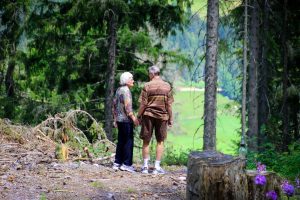Why Do We Kiss?
When you close your eyes and gently press your lips against someone else’s, have you ever wondered why we do it?
Is it just an expression of love, or is there more to it? In this article, we’ll explore the myriad reasons behind why we kiss, what happens to our bodies when we do it, and why we all love it so much.
The Intimate Nature of Kissing
At its core, kissing is an intimate act that is usually reserved for romantic and sexual relationships. It is a way to show affection, endearment, and care for one another.
But did you know that kissing can also reveal a lot about our genetics and immune system? Scientists have discovered that we unconsciously choose our partners based on the major histocompatibility complex (MHC) genes, which help our immune system identify and fight foreign invaders.
This means that when we kiss someone, we’re basically performing a compatibility test to see if our immune systems are compatible and if our genes complement one another.
The Cultural Significance of Kissing
While kissing is usually considered a romantic act, it also has different meanings in different cultures. For example, in some cultures, kissing on the cheek is a common greeting between friends and family members.
In others, kissing is considered taboo and is only done behind closed doors. But no matter where you go in the world, kissing is a universal sign of affection and love.
It’s a way to bond with one another, to show that we care, and to express our feelings in a physical way.
The Sensations of Kissing
Kissing can be a thrilling experience that fills your body with sensations and emotions. The softness of our partner’s lips, the taste of their mouth, and the way our bodies fit together can all create a sense of pleasure and intimacy that can be addictive.
But what’s happening inside our bodies when we kiss? For starters, our brains release a flood of hormones, including oxytocin and dopamine, that make us feel happy, connected, and relaxed.
Oxytocin is known as the “love hormone” and is responsible for feelings of trust and bonding, while dopamine is associated with pleasure and reward. Interestingly, kissing can also help alleviate feelings of depression and anxiety.
When we kiss, our brains release endorphins, which are natural painkillers that can help boost our mood and reduce feelings of stress.
How to Be a Good Kisser
Now that we’ve explored the reasons behind why we kiss and what happens when we do it, let’s talk about how to be a good kisser. While everyone has their own personal preferences when it comes to kissing, there are a few tips that can help make the experience more enjoyable for both you and your partner:
- Start Slowly: Don’t rush into a kiss too quickly. Take your time and build up to it gradually.
- Pay Attention to Your Breath: Bad breath is a major turnoff, so make sure to brush your teeth, floss, and use mouthwash before you kiss.
- Use Your Lips and Tongue: Mix up your kissing technique by using your lips and tongue sensually.
- Don’t Be Afraid to Experiment: Kissing is all about experimentation, so don’t feel like you have to stick to the same routine every time.
- Follow Your Partner’s Lead: Pay attention to your partner’s body language and follow their lead.
If they’re more aggressive, you can be too, and if they’re more gentle, you should be too.
How to Kiss Better: Techniques to Improve Your Kissing Game
Kissing is a vital component of any romantic relationship.
It helps create intimacy and passion between partners. However, have you ever wondered how to kiss better?
Are you unsure whether you’re doing it right? In this article, we’ll discuss various techniques that will help to improve your kissing game so that you can enjoy more intimate, adventurous, and satisfying moments.
Soft Lips and Gentle Touches
One of the crucial secrets to being a good kisser is having soft lips. Nobody enjoys the feeling of kissing someone with dry, chapped, or rough lips.
Therefore, make sure your lips are well-moisturized so that they feel soft and inviting. Additionally, you should build up to more passionate kisses gradually.
Start with gentle kisses on the lips or cheek and gradually increase the intensity when appropriate.
Consent Is Key
Before embarking on any kissing journey, it’s essential to ask for consent. Consent ensures that both you and your partner are comfortable and want to engage in the activity.
It’s okay to ask beforehand or during the moment. Remember, getting a clear and explicit response is important to ensure that your partner is up for it.
Practice Makes Perfect
They say that practice makes perfect, and this is no different when it comes to kissing. The more you kiss, the more you’ll hone your skills and build up your confidence.
Find opportunities to practice kissing, like in private, with someone you trust, or during a kiss-oriented game like “spin the bottle.” The more you kiss, the more you’ll get comfortable with it.
K.I.S.S: Keep it Simple, Sweetie
There is no need to over-complicate things when it comes to kissing.
K.I.S.S is an abbreviation that stands for “keep it simple, sweetie.” Don’t try to add too many tricks or moves to your kisses because that’s not always what your partner wants. Sometimes a simple, straightforward kiss is all it takes to blow your partner’s mind.
Comfort and Communication
Kissing is a two-way street, and it takes both partners’ efforts to make it enjoyable. It’s essential to communicate and ensure that you’re both comfortable with how the kiss is progressing.
Let your partner know when you’re enjoying the moment, or express when you’re not, if that applies. Additionally, remember that everyone’s preferred way to kiss is different.
So, take the time to get to know what your partner prefers, what turns them on, and what they don’t like.
Couples Counseling
In some instances, kissing may be a point of contention in a relationship, and you might need to seek out couples counseling. A therapist can help you explore your needs, find ways to compromise, and guide on what works for both parties.
FAQs on Kissing
Is Kissing Natural?
Yes.
Kissing is a natural way of expressing affection. Humans and other animals alike use kissing to show affection and develop social bonds.
Consider that kissing has been around for centuries in every culture, so it’s as natural as it can get!
Do You Close Your Eyes When You Kiss?
Most people tend to close their eyes when kissing.
This is because it helps us focus on the sensations and may create a sense of intimacy.
Is Kissing Good for Your Health?
There’s more to kissing than just passion. Kissing has several health benefits as well.
Kissing boosts the immune system, reduces blood pressure, and helps relieve stress, among other benefits.
Can Kissing Be a Form of Therapy?
Yes.
Kissing has been used as a form of therapy to treat anxiety and depression.
Additionally, the physical touch and connection during kisses can boost oxytocin levels, which is also known as the love hormone, leading to improved moods and mental wellbeing.
In conclusion, everyone can learn how to be a better kisser, and often it simply comes down to practicing and communicating with your partner to learn their kissing preferences.
Remember to take it slow, build up gradually, and keep it simple and sweet. By following these tips, you’ll find that you can enjoy kissing at an elevated level in your intimate relationships.
In summary, kissing is an intimate practice that is a vital component of any romantic relationship. We’ve explored the reasons behind why people kiss, including the cultural and genetic significance.
Furthermore, we’ve delved into the sensations and hormones released during kisses, which make them such a pleasurable experience. Lastly, we’ve looked at techniques to improve kissing, including the importance of consent, building up gradually, communicating with your partner, and seeking professional help if required.
With these insights, you can now approach kissing with more confidence and awareness, leading to more intimate and meaningful physical connection with your partner.



